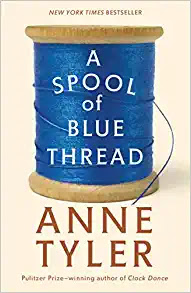Spurred in part by my enduring curiosity about the man, but maybe mostly because the title was available in audio from my library, I jumped again into the ocean of Salman Rushdie.
I guess the water was ok, because I've since secured copies of "Midnight's Children" and "The Satanic Versus" and they're on my summer reading list.
Anyway, Salman Rushie...
I watched the news a lot as a teenager. Partly because it's what was on TV in the late afternoon after school, but mostly--I like to think--because I really enjoyed it. I remember when I came to the realization that national news was interesting and local news seemed contrived and gimmicky, and stopped watching the local news. (It's been years since I've been able to stomach either, so, you know, different layers of contrivance, I guess.)
Anyway, I remember hearing a lot about Salman Rushdie and "The Satanic Versus" when watching the news in high school. The book (which, for those of you don't know, is just a novel) was published in late 1988. In mid-1989, Ayatollah Khomeini, Iran's "Supreme Leader" (a title that suggests a deep lack of appreciation for irony; I can't even say it without using air quotes) issued a fatwa (as I understand it, a sort of religious legal edict) for Rushdie to be killed. Ostensively, he was put off by passages which he believed to demean The Prophet. More probably, he was looking for something to rally the masses and help consolidate power after experiencing some embarrassing political setbacks. The threat on Rushdie's life was considered viable and serious by the government of the UK (Rushdie was a British citizen), and Rushdie was then assigned protective detail and essentially went into hiding. For nine years.
"Joseph Anton" is the name Rushdie chose for himself while in hiding. It is also the name he gave to the memoir that he wrote about his life, with most of the emphasis put on the period of his life in hiding.
There is so much here. So much to think about. So much to talk about. So much to have opinions about. But these are supposed to be tiny book reviews...
So, I'm going to offer just one line of thought, something I posted on Facebook a couple weeks ago:
I've been reading Salman Rushdie's memoir "Joseph Anton" and it's left me with two related feelings of near panic-inducing anxiety:
(1) Holy. Cow. That man's career has been so incredibly prolific, both in the sheer volume of production of meaningful fiction and non-fiction AND in the tremendously admirable political work that he's taken on over the decades under the most excruciating of circumstances that I'm left exhausted by awe. While surely our talents are not comparable, I'm left feeling a deep pit of guilt for all I have NOT accomplished with my comparably paltry ones.
(2) Reading Rushdie's fiction is difficult for this white-bread American boy as I don't have anything approaching the cultural knowledge to understand, for instance, references to Indian or Islamic history and culture (at, frankly, any level of subtly or nuance). I mean, I don't know what it means to be Indian, and I certainly don't know what it means to be an Islamic Indian. I don't know what that means in the context of Islamic Pakistan and the conflict over Kashmir. Other than some facts and figures and basic geographic and economic information, I don't really know ANYTHING about that world...and that is a very. big. world.
(I know so little that it feels a bit stupid to try to catalog the extent of my ignorance.)
Relatedly, a year or so ago I read "One Hundred Years of Solitude," which is by all accounts one of Latin America's greatest pieces of 20th century art, and most of the time was just completely lost. Again, knowing nothing more than the most trivial details of Columbian history and culture, every meaningful analogy, parable, or allegory was just shooting right past me.
What bothers me about all this is knowing--having it made so plainly and painfully manifest--that there exists this whole wide, deep, textured world of culture, history, and politics that I am so completely divorced from that I can't even read a popular work of literature and have any idea of what it all should mean.
(When it comes right down to it, I've lived in south-central PA for about 15 years and I _still_ feel like I'm a stranger in a strange land.)
So, I know that I could never _really_ know what it is to be Kashmirian or Columbian or really any other -ian. Worlds upon worlds exist in all their textured beauty all around me and I simply cannot know or relate or understand. And I might try all the rest of my life and I still wouldn't _really_ be able to scratch the surface of knowing.
Sometimes, this realization fills me with terrifying bouts of anxiety.
Like, I can feel it right now. A knot. Right there. In the pit of my stomach.
In elementary school, I bought a poster with a picture of a sloth hanging from a tree branch and one of those sort of parody motivational quotes:
"Thinking of all I didn't do yesterday, haven't done today, and won't do tomorrow...completely exhausts me."
At the time I thought it was funny and clever. Now, like prophecy, the passage haunts me.
I'm very glad to have read this book. In a sentence, I believe it has helped me become a better global citizen. In a second sentence, the book has left me with more questions than answers--more realizations of things I don't know than confidence in what I do know. By both counts--or by having achieving these ends--the book is a good book.
4 of 5 stars.

















